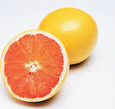 A bewildered e-mail from the owner of a prolific grapefruit tree asking us for recipes and other uses for his overabundant crop, is prompting this reminder of the potential health hazards posed by this otherwise nutritious fruit. While surprisingly many people remember the Grapefruit Diet touted from time to time as an effective weight loss measure, hardly anyone seems to recall the scary headlines of recent years about this particular citrus fruit’s toxic interaction with certain prescription drugs and medical conditions.
A bewildered e-mail from the owner of a prolific grapefruit tree asking us for recipes and other uses for his overabundant crop, is prompting this reminder of the potential health hazards posed by this otherwise nutritious fruit. While surprisingly many people remember the Grapefruit Diet touted from time to time as an effective weight loss measure, hardly anyone seems to recall the scary headlines of recent years about this particular citrus fruit’s toxic interaction with certain prescription drugs and medical conditions.
So here is an abbreviated update of why and how eating grapefruit or drinking its juice could be hazardous to your health: Our bodies contain a group of enzymes (i.e. the cytochrome P-450 system), one of which (CYP 3A4) helps us metabolize various pharmaceuticals and toxins, making them weaker, less harmful and/or easily excreted. Grapefruit—especially when taken as juice—interferes with CYP 3A4, thereby increasing the potency of medications or toxins, flooding the bloodstream with larger, often dangerous and in rare instances, fatal doses. Cholesterol-lowering statins such as Lipitor, antidepressants such as Prozac,  blood-pressure lowering drugs, Viagra, caffeine and even some vitamins and other natural supplements are among the substances that tend to interact with grapefruit in unhealthy ways. To be safe, it’s best that people taking prescription drugs avoid grapefruit altogether, while others should indulge in small amounts, not too often and preferably hours before or after taking vitamins, supplements or anything containing caffeine (even chocolate).
blood-pressure lowering drugs, Viagra, caffeine and even some vitamins and other natural supplements are among the substances that tend to interact with grapefruit in unhealthy ways. To be safe, it’s best that people taking prescription drugs avoid grapefruit altogether, while others should indulge in small amounts, not too often and preferably hours before or after taking vitamins, supplements or anything containing caffeine (even chocolate).
What’s in a name? Certainly not a molecule of grape in grapefruit. But while the name is a mystery, its ancestry is not, believed to be a natural hybrid of the melon-size pummelo (or pomelo) and some other citrus species. Nor is the fruit’s treasure-trove of nutrients a secret: With 80-120 calories per fruit (40-60 calories if we take into consideration that practically no one eats—or drinks the juice of—more than a half grapefruit), the rest of its bragging rights include an excellent source of fiber, pectin, potassium, magnesium, vitamin C, thiamin, niacin, folic acid, calcium, biofavonoids, etc.


One Comment on “SHORT TAKES: Grapefruit Alert”
I just could not leave your site before suggesting
that I extremely enjoyed the usual information a
person supply on your guests? Is gonna be back continuously in order to inspect new posts